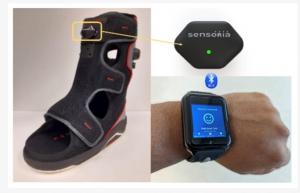Smart Boots Hold Promise for Improving Adherence to Diabetic Foot Ulcer Treatment-- Especially Underserved Populations
Increasing patient adherence to mechanical offloading will translate into better outcomes and a reduced number of amputations.
In the world and in this country, there is an amputation every twenty seconds and that is just due to diabetes and more precisely to diabetic foot ulceration (DFU). There is no amputation without ulceration. Diabetic foot ulcers require close and constant clinical attention for a few months. To maximize chances of healing, the patient is often asked to wear a specially designed offloading boot to increase blood circulation in the wound area. However, most of DFU patients don’t have the “gift of pain” since they don’t feel their feet normally. This is a condition called “peripheral neuropathy” which is very common with diabetic patients. Therefore, patients during their daily life tend to remove their offloading boot since they feel no pain. According to previous research studies only 28% of patients are always wearing their boot and in line with their clinician’s guidance. This is why there is a 76% failure rate on healing diabetic foot ulcers and why most patients that are treated for a DFU experience an amputation. The average patient’s life expectancy after an amputation is five years, same as some of the most aggressive cancers. The cost to the US taxpayer is estimated to be $17.5B per year. This is the reason why USC Keck School of Medicine and Baylor College of Medicine reached out to Sensoria.
The precision medicine-driven quantified offloading system leverages Sensoria Core electronics applied to the new Defender boot. Each patient is provided with a smart watch (4G/LTE) with a dedicated app that provides behavioral feedback. The joint USC and Baylor research team can remotely monitor each patient's activity and adherence via a color-coded Microsoft Azure Cloud powered system.
Participants in the study were randomized to wear one of three types of walkers: irremovable, removable, or smart removable walkers (smart boot) that provided feedback on adherence and daily walking. The researchers used a 15-item questionnaire based on the Technology Acceptance Model (TAM) to assess user perspectives of the walkers. The study found that smart boot users reported that learning how to use the boot was easier compared to similar products, and that people who identified as Hispanic or Latino were more likely to like using the smart boot and would use it in the future.
According to co-senior author Bijan Najafi, "Our study provides important evidence that smart offloading walkers could help improve adherence to prescribed use among underserved populations, ultimately leading to better outcomes for patients with DFUs. By understanding user perspectives and preferences, we can work towards optimizing the design and implementation of this technology in clinical practice, with the goal of improving access to care and reducing health disparities."
Further research in this area could help optimize the design and implementation of this technology in clinical practice. Co-senior author David G. Armstrong, podiatrist with Keck Medicine of USC and professor of surgery at the Keck School of Medicine of USC, added “We hope the findings of this study help facilitate merging precision health and technology to improve mobility and ultimately reduce unnecessary amputations in patients with diabetes."
We need to continue to collaborate to find a solution to this problem that is quickly becoming of epidemic proportions.
Sharlene Jerome
Sensoria Health Inc.
+1 425-533-2928
email us here
Legal Disclaimer:
EIN Presswire provides this news content "as is" without warranty of any kind. We do not accept any responsibility or liability for the accuracy, content, images, videos, licenses, completeness, legality, or reliability of the information contained in this article. If you have any complaints or copyright issues related to this article, kindly contact the author above.

